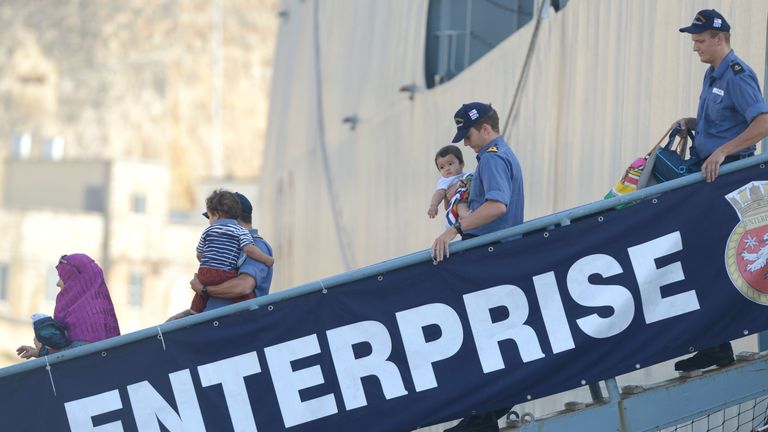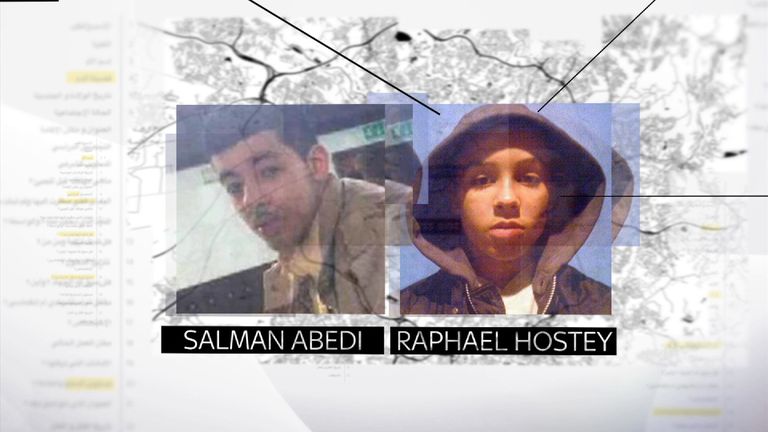Manchester bomber Salman Abedi was rescued from Libyan civil war by Royal Navy (original) (raw)
The suicide bomber who killed 22 people at an Ariana Grande concert in Manchester last year had been rescued from the Libyan civil war by the Royal Navy.
Salman Abedi detonated a home-made bomb in the foyer of the Manchester Arena on 22 May 2017 as concert-goers, many of them children, were leaving the venue.
Nineteen died at the scene while three were rushed to hospital and pronounced dead shortly afterwards. More than 200 other people were injured.
Please use Chrome browser for a more accessible video player
Daughters, wives, friends - victims of the Manchester attack
It has now emerged that in 2014 Abedi, his brother Hashem and around 100 other British citizens were evacuated from Tripoli by HMS Enterprise as the security situation in Libya deteriorated.
They were taken to Malta before returning to the UK.

Image: People disembark from HMS Enterprise in Malta following the 2014 Tripoli evacuation
A government spokesman said: "During the deteriorating security situation in Libya in 2014, Border Force officials were deployed to assist with the evacuation of British nationals and their dependants."
It is understood Abedi's name was on a list of stranded citizens handed to the crew in charge of the evacuation.
More on Manchester Bombing
-
 Legal action against MI5 over Manchester Arena bombing cannot continue, judges rule
Legal action against MI5 over Manchester Arena bombing cannot continue, judges rule -
 Manchester Arena survivors awarded £45,000 after harassment claim against former TV producer Richard Hall
Manchester Arena survivors awarded £45,000 after harassment claim against former TV producer Richard Hall -
 Manchester Arena attack survivors win harassment case against conspiracy theorist Richard Hall who claims it was hoax
Manchester Arena attack survivors win harassment case against conspiracy theorist Richard Hall who claims it was hoax
Until a month before his rescue, Abedi was being monitored by UK security forces. The review into the Manchester attack found that, based on the information available at the time, the decision to close his case was sound.
Hashem Abedi is currently held in jail in Libya by a militia group, but the British government has requested his extradition to face trial for his involvement in the Manchester attack.
Please use Chrome browser for a more accessible video player
Manchester bombing: One city, one voice
Libya has been plunged into chaos since the uprising against long-time ruled Muammar Gaddafi, who was killed in 2011.
Since disputed elections in 2014, the country has been split between competing political and military factions in the west and east of the country.
The country has been torn in two. The Tripoli government is rejected by its eastern-based rivals.
Political turmoil and armed conflict have led to economic collapse, allowing migrant smugglers to flourish and giving space to Islamist militants.
By July, the UN had to pull out of Libya, embassies were shut and foreign travellers and tourists had to leave.

Image: Salman Abedi and Raphael Hostey grew up in the same area of Manchester
Salman Abedi was born in Manchester in 1994 after his parents had fled the Gaddafi regime in Libya.
A Sky News investigation revealed how Abedi spent some years on the same housing estates in south Manchester as a group of young men who radicalised each other, with some fighting for IS in Syria and Iraq.
Information in the 'IS Files' - a huge cache of documents obtained by Sky News - shows how an IS fighter called Raphael Hostey, from Moss Side in the south of the city, sponsored hundreds of terror recruits.
Abedi and Hostey hung around on the same estates and worshipped in the same Didsbury mosque, before they became disaffected with life in the West.